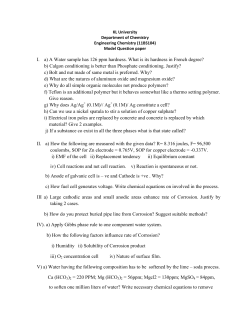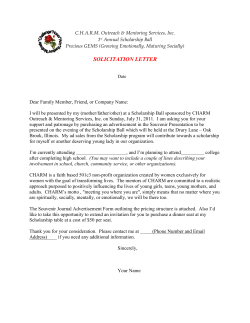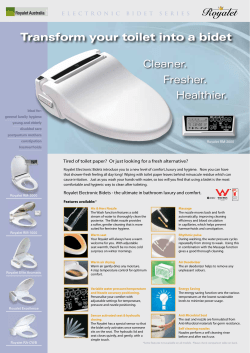
How To Specify Ordering Number System for Configuring
How To Specify Ordering Number System for Configuring CF Ball Valves & Automation Assemblies Example Shown Below: Class 150, Two Piece Ball Valve, Full Port, Raised Face Flanged End, 15% Glass RPTFE Seats Cast Stainless Steel 316 CF8M, Two Inch Size with Spring Return Pneumatic Actuator - Fail Closed, Nema 4/4x Flat Top Limit Switch Enclosure containing Two SPDT Mechanical Switches with Three Way Direct NAMUR mount Pneumatic Spool Valve with 110VAC coil and 1/2” NPT Conduit Connection. 1 2 3 4 5 F15 F R C 2 series ends seats body material size 6 7 8 8 SR85-6Z 3N5TS FFYB1120 valve options actuator controls actuator controls 6 1 2 3 Select Valve Series 4 Select Body Material 5 6 7 Select Valve Size 7 Select End Connection Select Seat Material Select Valve Option or Actuator 4 1 5 2 3 MODEL NUMBER F15FRC2-SR85-6Z-6FFYB1120-3N5TS Select Actuator Controls P/N 3.1.01 End Connections F Flanged Raised Face S Threaded / Screwed Industry standard flanged end with raised face to ANSI B16.34 Cl. 150, 300 ends NPT is the most common end connection for small ball valves made to ANSI B1.20.1 ends W Socket Weld X Screwed X Socket Weld B Sch. 40 Buttweld M Tube End Buttweld Female socket weld connection in accordance with ANSI B1.20.11 ends Common combination of end connections for use on three piece ball valves. ends ANSI standard schedule 40 pipe with beveled ends for quick installation. ends Clean service end option normally includeds highly polished interior. ends T Tri - Clamp type Clean service ends typically used when easy diconnection is required. ends P/N 3.1.02 Seat Materials R Reinforced PTFE T Virgin PTFE seat code seat code C seat code This material is offered as the standard seal in most CF ball valves. 15% Glass Reinforced PTFE rated suitable for temperatures -50 degree F. to 450 degree F., chemical resistance is compatible to Virgin TFE with improved cycle life and greater pressure-temperature rating than PTFE. * R-seats are furnished with RPTFE body seals and PTFE packing except on FZ15, FZ30 and FZ20 FIRESAFE models which are furnished with graphoil packing and body seals. This material is the basic seat material used in most ball valves. Its chemical compatibility is excellent for almost all media service application. Temperature range -50 degree F. to 400 degree F. Carbon Filled PTFE Carbon Filled TFE - 25% Carbon Graphite with 75% PTFE, is good for temperature ranging from -50 degree F. to 575 degree F. This material offers a wide temperature range with better cycle life than RTFE. S Stainless Steel Filled PTFE D Delrin P PEEK N Nylon U UHMW Polyethylene K Kel F F Filled Cavity seat code seat code seat code seat code seat code seat code seat code Combines the strength of metal with the lubricity of TFE. 50% 316 powder combined with 50% TFE. Offers abrasion resistance of metal with higher pressure and temperature rating than RTFE. -20 degree F. to 550 degree F. Special Delrin seats are offered for higher pressure and lower temperature service. They can be used in high pressure air, oil, and other gas media but are not suited for strong oxidizing s. Temperature rating 30 degree F. to 200 degree F. D-seats are furnished complete with 90 durometer Viton body seals. Polyetheretherketone - high temperature semi-rigid elastomer. Best suited for high pressure and temperature service. Also offers very good corrosion resistance. Tempereture rating -70 degree F. to 550 degree F. Nylon (polyamide) seats are offered for higher pressure and lower temperature service. They can be used in high pressure air, oil, and other gas media but are not suited for strong oxidizing s. Temperature rating -30 degree F. to 200 degree F. Ultra-high molecular weight Polyethylene. Ideal for use in low level radiation service. This seat also meets the requirements of the tobacco industry where TFE is prohibited and it offers excellent resistance to abrasive media. Temperature range -70 degree F. to 200 Degree F. Recommend for cold service with good resistance to violent temperature fluctuations. It is good for cryogenic service down to -325 Degree F. and has a higher deformation rating and density than RPTFE Designed to reduce the possibility of contamination by entrapment of process fluid in the void normally found behind the ball and the valve body in conventionally designed ball valves. Ideal for applications where cross contamination is a concern, such as food, pains and dyes. * available for Series F12 and F20 only P/N 3.1.03 Body Materials C ASTM A351 gr. CF8M 316 Stainless Steel S ASTM A216 gr. WCB Carbon Steel D ASTM A351 gr. CF3M 316L Low Carbon Stainless Steel A ASTM A351 gr. CF8 304 Stainless Steel code code code code B code J The corrosion resistant alloy Type 316 is a molybdenum steel possessing improved resistance to pitting by solutions containing chlorides and other halides. In addition, it provides excellent elevated temperature tensile, creep and stress & rupture strengths. Standard stock body material for CF Ball Valves. Normally stocked with 316SS Ball and Stem, Body is exterally phoscoated for protection against weather. The use of 316L is recommended when exposure in the carbide precipitation range is unavoidable and where annealing after welding is not practical. Good corrosion resistance to chlorides. General purpose corrosion resistant alloy. Has a low carbon content and is non- magnetic. May be susceptible to chloride stress corrosion cracking. ASTM A351 gr. CF3 304L Low carbon Stainless Steel Type 304L has a carbon content of 0.03% or less. This alloy can be used in the as-welded condition without becoming susceptible to inter-granular corrosion. May be susceptible to chloride stress corrosion cracking. Commonly used where field working is employed. ASTM A351 gr. CN7M Alloy 20 Superior resistance to stress-corrosion cracking in boiling 20 to 40% sulfuric acid. Excellent general corrosion resistance to sulfuric acid. Excellent resistance to chloride stress corrosion cracking. Excellent mechanical properties and fabricability. code H ASTM A296 gr. CW-12M Hastelloy C Outstanding corrosion resistance in oxidizing environments, excellent resistance to pitting and stress-corrosion cracking and maintains corrosion resistance in welded joints. code M ASTM A296 gr. M-35 Monel Superior resistance corrosion in many chemical applications and excellant resistance to salt water. code P/N 3.1.04
© Copyright 2025





















